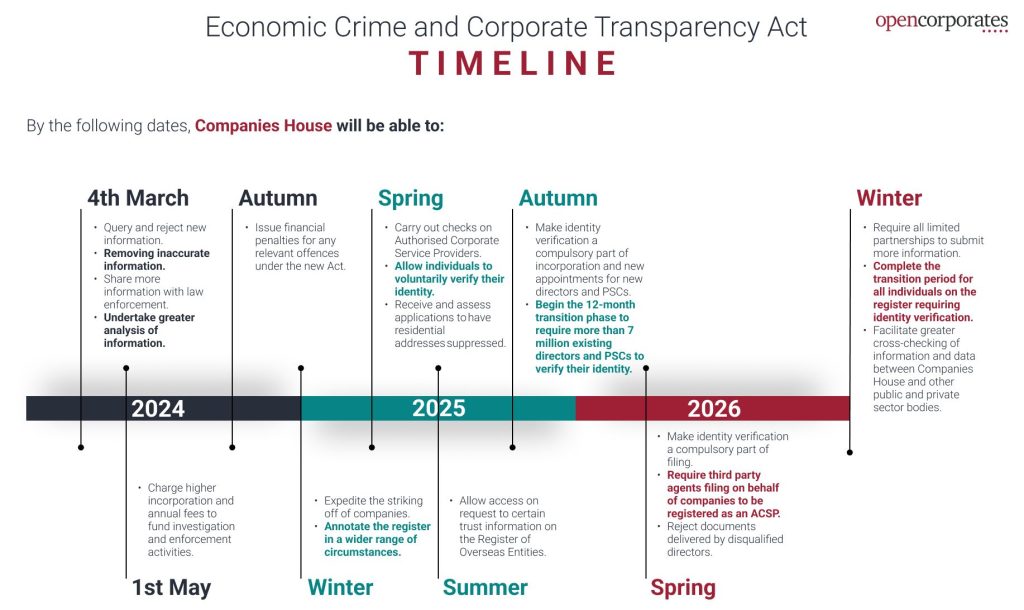UK legislation is always an exciting read. Both Andrew and I love reading the Companies Act 2006. To be clear though, we don’t read it for fun. Since our data is reliant on Companies House and their comprehensive data, it’s important we develop an understanding of some of the most important parts (account filings, addresses etc.).
This is why we pay close attention to legal updates affecting Companies House. A recent and significant one is the Economic Crime and Corporate Transparency Act (ECCTA), which became law in October 2023. It has started to introduce significant changes to company law and the data which resides in Companies House. Here’s a nicely summarised timeline from OpenCorporates:

There are a couple of important parts missing that will positively affect the quality of our data, but the visual representation of the timeline is beneficial for understanding where we’re at. There are already some well-written blogs (1, 2, 3) that summarise the changes with a better understanding than I can manage so I’d recommend reading those if you’d like to dive into more detail. I’m going to focus on us, on our data and how this part of legislation improves the customer experience of our platform.
Identity verification
The ID Verification Process is designed to stop fraudsters from taking advantage of Companies House. Ideally, it’s going to block fake appointments, false information, and bogus directors or beneficial owners from making it onto Companies House records.
Ultimately, for us, this means that the data we extract and integrate into our platform from Companies House is more accurate and reliable. Our users can spend more time focusing on real companies for their economic analysis and discovery.
At The Data City we work to explore inter-operational relationships between companies using related metrics in our data for example, registered address, website etc. False directors cause us complications and effectively waste our time. This change focuses us on companies actively contributing to the economy.
The draft regulations released by Companies House (DRAFT Registrar’s Rules under Regulation 6 of the IDV and ACSP SI 2024 (companieshouse.gov.uk) highlight the types of information and evidence an individual or an ACSP will need to verify a person’s identity. Part 4 of the draft regulations sets out the new provision for the allocation of Unique Identifiers (UIN) (sections 1082 and 1087 CA 2006, as amended by section 68 ECCTA).
A UIN is a unique code ‘consisting of one or more sequences of letters or numbers’ (as per regulation 23(2)) that will be given to all individuals who have had their identity verified (regulation 23(1)), including an ACSP. Individuals must obtain the UIN to confirm that they have had their identity verified and they will only be given one UIN only.
Alex Craven is my CEO. He’s a great CEO and I can look him up on Companies House. Alex founded Bloom back in 1999 and sold Bloom to Jaywing in 2016 therefore you can see him as an ex-director of both of Bloom and Jaywing companies on Companies-House. But you can see Companies House is unable to identify Alex is/has been a director for all 3 companies.
This is problematic because it complicates founder analysis. We might want to know Alex is a promising founder! We’ve used common analysis techniques to identify the same/similar name, same birthdate, address etc. But an ID would prove to be a more reliable method for inter-company analysis. I don’t think we’ll get the ID but it would be amazing to have.
Addresses
Registered offices must be at an “appropriate” address, i.e. one where documents can be delivered to the company or for the attention of someone acting for the company. Our location data relies on multiple sources. Some companies are using PO boxes or a solicitors/management company that acts as their registered address. Here’s a great blog from OpenInnovations in 2019 which demonstrates how often this happens and they state: “There isn’t anything inherently wrong with companies being registered through management addresses. It just means being careful not to bias your aggregate statistics”.
We agree with this but obviously the improvement to companies addresses means an improvement to our data. Essentially, when we’re calculating summary statistics within analyse, we’ll be using more real (operational) addresses thus delivering improved analysis. We already work hard on this but it’s great to know one of our source datasets is being improved.
Persons with Significant Control (PSCs)
Under the ECCTA, Companies House is stepping up its scrutiny of filings related to Persons with Significant Control (PSCs) mainly for companies that haven’t provided any PSC information or where the data looks a bit suspicious. For The Data City, this is a positive change. It means the ownership and control data we rely on will be more accurate and trustworthy.
Better PSC data helps us link people and companies more reliably, which is important when we’re building networks, analysing founders, or mapping RTICs. In short, it means better insights for our users.
Email (the dream, but unlikely!)
Companies are now required to provide an “appropriate” email address to the registrar. This change is clearly beneficial for Companies House, as it enables faster, more reliable communication with businesses especially for filing reminders, compliance updates, and regulatory notices.
If The Data City were extremely lucky, we would request access to the domain portion of each email address. For example, from [email protected], we’d extract thedatacity.com, which corresponds to our official website. This domain data could play a valuable role in improving our website matching process by providing a strong signal that links a company to a specific online presence. We would heavily weight matches to custom domains and filter out generic ones like gmail.com, yahoo.com, or hotmail.com, which are not useful for verification.
While this kind of data would be hugely valuable to us, it’s unlikely we’ll gain access since email addresses are considered sensitive personal data and will not be publicly disclosed. So, although the change improves data quality and communication at Companies House, it’s unlikely that The Data City will directly benefit from it in the short term.
Summary
The Economic Crime and Corporate Transparency Act is bringing big improvements to Companies House data. For The Data City, this means more accurate and reliable information to power our platform.
Identity verification and unique IDs should reduce fake directors and help us track individuals across companies. Stricter rules on addresses mean better location data, and improved PSC (ownership) records will strengthen our internal network analysis.
While we likely won’t get access to email domains, the requirement still signals a step toward better data overall. In short: cleaner data, less noise, better insights.
Curious about our data? Sign up for a free trial today, or reach out to the team.


